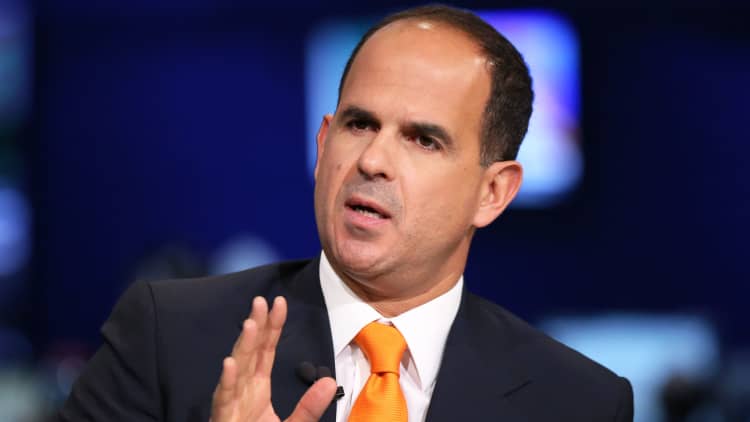You may not have been on one (or even heard the term before), but an informational interview can be your ace in the hole during the job seeking process. At its core, an informational interview is a casual conversation between a job seeker and somebody who works at a company they're interested in designed to help them gather intel on what it's like working at the company and what opportunities they have available.
But don't let the name fool you — informational interviews can do much more for you than just provide you with information. If you play your cards right, an informational interview can help get your foot in the door of the company you've got your eye on and eventually, may even help you land a job.
Interested, but don't know where to start? Leverage this three-part strategy.
More from Glassdoor:
22 companies hiring like crazy in June
How to become the candidate recruiters can't resist
16 companies with great benefits hiring now
I. Reach out
It's always nice if you already know somebody who works at the company, but if you don't, getting in touch via email or social media is perfectly acceptable. Career Coach Angela Copeland recommends keeping the following points in mind when you first reach out to inquire about an informational interview:
- Keep it brief and simple — make it easy for the person to read your message.
- Consider calling an informational interview a "networking meeting," since many people have never heard the term "informational interview" before.
- Speaking of which, don't ask for a job straight away — they may not have one for you today, and they could be turned off by your directness.
- Find something you have in common with the person, such as the same school, the same degree, the same hobby, or some other similar interest, and mention it in your note.
- Provide an authentic compliment of the person and possibly their company. Let them know why you want to meet with them.
- Ask the person to meet with you. Give a specific day or a few specific times. Don't ask for "anytime in the future." This is too broad.
- Volunteer to meet the person at their office or at a location close by. Make it easy for them.
- For bonus points, offer to take the person out to coffee or lunch – your treat. Everyone loves a free lunch!
Need a little more help drafting your outreach note? Copeland drafted a couple of templates that you can use to base your message off of. If you know or have already met the person you wish to reach out to, try something like this (with specific names and details updated according to eayour situation, of course):
Dear Jim,
I hope you're having a great day! It was great seeing you last week at the neighborhood cookout. As you know, I'm also an MBA graduate of Pepperdine University. I'm a big fan of the work you're doing at ServiceMaster, and I admire the effort the company is putting in around small business development within our community.
I would love the opportunity to sit down with you for just a few minutes to learn more about your career, and about ServiceMaster. Is there a time next Thursday that might work well for you? I'm happy to come to your office or to meet somewhere nearby — whichever is the most convenient for you.
Thank you for your consideration!
Sincerely,
Angela
If you haven't met the person you're reaching out to, try this (again, updating names/details as appropriate):
Dear Jim,
I hope you're having a great day! I'm writing to introduce myself to you. I'm also an MBA graduate of Pepperdine University. I'm a big fan of the work you're doing at ServiceMaster, and I admire the effort the company is putting in around small business development within our community.
I would love the opportunity to sit down with you for just a few minutes to learn more about your career, and about ServiceMaster. Is there a time next Thursday that might work well for you? I'm happy to come to your office or to meet somewhere nearby — whichever is the most convenient for you.
Thank you for your consideration!
Sincerely,
Angela
II. Ask the right questions
Once you've actually scheduled a meeting with someone, "be sure you get the most out of your time," Copeland says. "Research everything you can about the company and the individual online in advance. Stay away from basic questions you can easily find out on your own."
A few she recommends asking in particular are:
- What inspired you to leave your last job to come to this company?
- What do you like about the company?
- How did you position your career to eventually become the role you are now?
- What types of roles did you have prior to this role?
- What was the hardest thing about rebranding yourself for this new industry or role?
- What's one way you expect the company or the industry to change in the next year to five years?
- What's your favorite part about your job?
- What is different about your company or your job that you didn't expect?
- What's something you wish you'd known when you started your career?
- If you could change one thing about the company you work for, what would it be?
- Do you feel that extra certifications or degrees add value in this field?
- What advice would you give someone in my situation?
- Is there anyone else you think it would be good for me to meet?
Make sure to stay engaged in what they're saying — this information will give you a good idea of whether or not the company is even a good fit for you. You may even want to take notes to reference later if you decide to end up applying.
Finally, Copeland advises that job seekers avoid common faux pas like directly "asking for a job, dominating the conversation with information all about you, taking up too much of their time, and expecting the person to pay for their own lunch or coffee if they are meeting you at a restaurant."

III. Follow through
The heavy lifting is generally over once you've already met with somebody, but following up with them is key to ensuring that your informational interview proves fruitful. Sending a thank-you note within a day or so of your meeting is key. As you would after an interview with a recruiter, make sure your note expresses gratitude for your interviewer's time, appreciation for gaining more information and insight into the position and company, and enthusiasm/interest in working at the company.
At this point, asking about open roles or recommendations is generally appropriate. However, you want to make sure you go about it in the right way — unless the person you spoke with is a full-time recruiter, filling open jobs at the company probably isn't their primary concern. To show proactivity on your part and demonstrate respect for their time, research open roles on the company's career site or Glassdoor page first to see what might be a good fit for you instead of simply asking them if they could tell you more about open roles.
In your message, try saying something to the effect of "I saw that your company is currently hiring for a Marketing Manager role. If you think I'd be a good fit for the position, I'd love if you could put me in touch with or mention my name to a recruiter!" If you can't find any open positions that seem like a good fit, though, you may just want to say something like "It looks like there aren't any positions that quite fit my experience and skills at the moment, but I hope you keep me in mind if something opens up!"
Even if your informational interview doesn't directly lead to a recommendation or referral , though, don't stress — it doesn't mean you necessarily did anything wrong. As with many facets of job seeking, informational interviews can be a numbers game, where you have to go on a lot of them before anything concrete comes out of it. The good news? That kind of proactivity is exactly what you need to be successful in your job hunt — and with each informational interview you go on, you're that much closer to finding the position that fits your life.
This article originally appeared on Glassdoor.
Like this story? Like CNBC Make It on Facebook.
Don't miss: Marcus Lemonis reveals the one question job candidates should never ask in an interview


